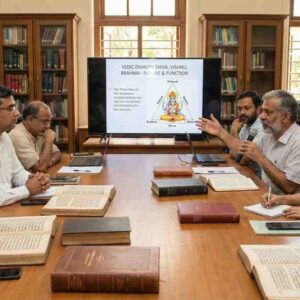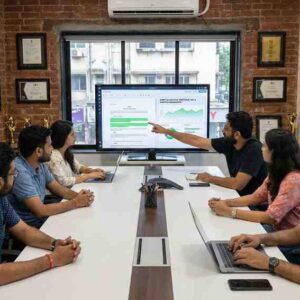Key Highlights:
- The Indian government is spearheading initiatives to integrate Artificial Intelligence (AI) into the manufacturing sector, enhancing efficiency and global competitiveness.
- Programs like the National Program on AI, Industry 4.0 initiatives, and the India AI Mission are driving this transformation.
- AI applications in manufacturing include predictive maintenance, process automation, and real-time quality control.
Revolutionizing Indian Manufacturing with AI
India’s manufacturing sector is undergoing a massive transformation, thanks to the integration of Artificial Intelligence (AI). From automating processes to reducing downtimes and enhancing product quality, AI is reshaping how goods are produced and delivered. Recognizing its potential, the Indian government is playing a crucial role in fostering AI adoption, ensuring that India remains competitive in the global marketplace while creating opportunities for domestic innovation.
Government Initiatives Promoting AI in Manufacturing
National Program on Artificial Intelligence
The Ministry of Electronics and Information Technology (MeitY) launched the National Program on AI to make India a global AI hub. This program emphasizes AI research and development, focusing on sectors like manufacturing to boost productivity and innovation. It supports the creation of AI centers of excellence, encouraging collaborations between academia, industry, and the government.
Make in India and Industry 4.0 Policies
Under the “Make in India” initiative, the government has introduced policies that encourage manufacturers to adopt Industry 4.0 technologies, including AI. These policies aim to modernize factories, streamline operations, and reduce costs while ensuring sustainable practices.
IndiaAI Mission
The IndiaAI Mission, introduced in the Union Budget 2024-25 with an allocation of ₹551.75 crore, is designed to strengthen AI infrastructure in the country. This includes procuring high-performance GPUs and developing indigenous AI tools that support manufacturing processes. By reducing dependence on foreign technology, the government aims to make AI integration more accessible and cost-effective for Indian manufacturers.
Samarth Udyog Bharat 4.0
This program, launched by the Ministry of Heavy Industries, promotes the adoption of smart manufacturing technologies in small and medium enterprises (SMEs). AI-based tools are being introduced to enable these enterprises to optimize their operations and compete globally.
Real-World Impact of AI on Indian Manufacturing
- Predictive Maintenance:
AI helps manufacturers predict equipment failures before they happen, reducing downtime and maintenance costs. For example, Tata Steel has adopted AI-powered predictive analytics to monitor equipment performance, resulting in significant savings. - Process Optimization:
AI algorithms analyze production data to identify inefficiencies and recommend improvements. Companies like Maruti Suzuki use AI to streamline assembly lines, ensuring faster production cycles. - Quality Assurance:
AI systems equipped with machine vision technology detect defects in real time, ensuring high-quality products. This has become a standard practice in India’s automotive and electronics industries. - Supply Chain Efficiency:
AI-driven supply chain management tools help manufacturers forecast demand, manage inventory, and ensure timely delivery of goods. This is especially critical for sectors like pharmaceuticals and consumer goods.
Collaborations Driving AI Integration
The government is partnering with private companies, startups, and research institutions to accelerate AI adoption in manufacturing. Initiatives like the National Mission on Interdisciplinary Cyber-Physical Systems encourage innovation by providing grants and access to advanced facilities. Collaborations with global tech firms have also enabled Indian manufacturers to adopt state-of-the-art AI solutions tailored to local needs.
Challenges and Solutions
Despite its potential, AI integration in manufacturing faces challenges like high implementation costs, lack of skilled professionals, and limited awareness among small-scale industries. To address these:
- Skill Development:Programs like the Pradhan Mantri Kaushal Vikas Yojana are training workers in AI and other advanced technologies.
- Financial Support:The government offers subsidies and tax incentives to encourage manufacturers to invest in AI tools.
- Awareness Campaigns:Initiatives are being launched to educate manufacturers, especially SMEs, about the benefits of AI integration.
The Road Ahead
India’s journey toward becoming a global manufacturing powerhouse is being fueled by its strategic embrace of Artificial Intelligence. With robust government policies, growing collaborations, and increasing adoption of AI-driven solutions, the manufacturing sector is set to witness unprecedented growth. These efforts not only promise economic benefits but also ensure that India remains at the forefront of the global Industry 4.0 revolution.













